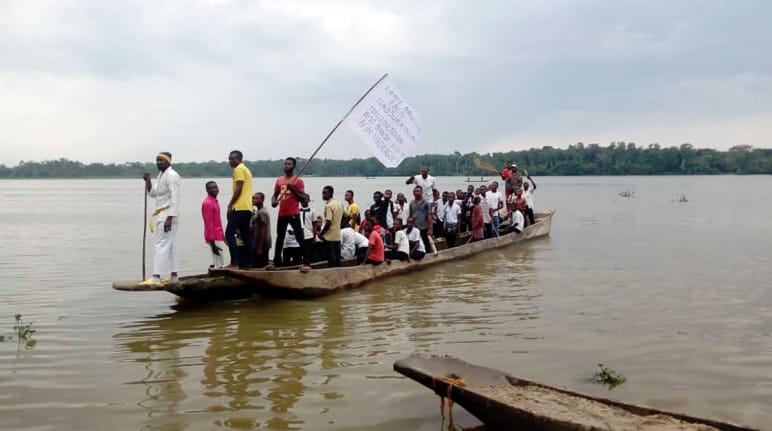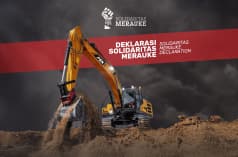DR Congo: Stop the destruction by miners and loggers in Tshopo!
 Local people protesting on boats against the pollution of the Aruwimi River (© RIAO-RDC)
Local people protesting on boats against the pollution of the Aruwimi River (© RIAO-RDC)
The Democratic Republic of the Congo is home to the second largest area of rainforest on Earth. Defending it is crucial to the fight against climate change and the extinction crisis. Yet miners are polluting rivers and loggers clearing forests in Tshopo province. In the small town of Basoko, local people are fighting back.
Call to actionTo: the President of the Democratic Republic of the Congo, Félix Antoine Tshisekedi
“Protect the rainforests of the Democratic Republic of the Congo from destructive logging and the toxic impacts of mining.”
The people of the small town of Basoko fear for their health and livelihoods: the Aruwimi River, a tributary of the Congo, has been polluted ever since the Chinese mining company Xiang Jiang Mining began dredging for gold there. Some species of fish have disappeared completely. Skin diseases are on the rise.
"We say NO to mining in Aruwimi, which is destroying our ecosystem in an anarchic way," states a memorandum to the county government read during a demonstration. On March 11, 2022, residents of the region protested on land and with boats against the trashing of their environment.
Mining is not the only threat to nature in Tshopo province: companies such as FODECO, Congo Futur and SOFORMA are reportedly logging at a breakneck pace near Basoko.
"They are systematically plundering the forests without any benefit to local people," says Jean-François Mombia Atuku, chairman of the environmental protection organization RIAO-RDC. "Anyone who demands accountability is silenced," he said, adding that workers are "kept like slaves" in the forest. "Human rights are not relevant for these companies."
The grievances regarding mining have been heard in the capital Kinshasa: In January 2022, Environment Minister Eve Bazaiba called on Xiang Jiang Mining to cease operations by February 25, 2022. However, nothing has changed since then – the company is still operating, apparently unimpressed.
"What we need now is international pressure," says Jean-François Mombia Atuku. It must be brought to bear on President Tshisekedi, who positioned his country as a heavyweight in the fight against the climate crisis during the COP26 climate conference.
It’s time to apply that international pressure – please sign our petition.
BackgroundThe tropical rainforests of the Democratic Republic of the Congo (DRC) cover 99.8 million hectares (2020), making them the second largest on earth. Brazil ranks first with 318.7 million hectares, with Indonesia in third place with 84.4 million hectares.
The Congo Basin also includes Gabon, with 22.4 million hectares of rainforest (ranked 9th), and the Republic of Congo with 20.8 million hectares (ranked 10th).
All major rainforest countries have been the scene of wholesale deforestation. Between 2001 and 2020, 24.5 million hectares were lost in Brazil, 9.4 million hectares in Indonesia and 4.8 million hectares in the DRC.
Logging moratorium keeping timber industry at bay
A moratorium on new logging concessions has been in effect in the DRC since 2002. Without this ban, the rate of deforestation would probably be significantly higher. In late 2021, the government in Kinshasa briefly threatened to lift the ban, but then dropped the idea, possibly with an eye toward the UN climate conference COP26 in Glasgow.
International donor organizations have provided hundreds of millions of dollars to the DRC to protect the forest. A further billion dollars are in the pipeline through the Central African Forest Initiative (CAFI) fund and other organizations. The proposal to lift the moratorium was probably intended as a means of exerting pressure in this regard.
Allegations have repeatedly been made regarding the granting of logging concessions despite the moratorium. In 2018, CAFI temporarily suspended its payments because then Environment Minister Amy Ambatobe was reported to have renewed three concessions to Chinese companies. In 2020, a complaint was filed against the then Minister Claude Nyamugabo for awarding concessions.
Land grabbing by palm oil company PHC
The Basoko region is also home to plantations and concessions of Plantations et Huileries du Congo (PHC), a palm oil company. The plantations originated 110 years ago, when the Belgian colonial government handed over large tracts of forest to the English businessman Lord Leverhulme. The local people never agreed to this move – they were simply robbed of their land and thus their livelihoods. The concessions were the foundation of today's British multinational conglomerate Unilever. In 2009, Unilever sold its lands to the Canadian company Feronia. When Feronia went bankrupt in 2020, the Mauritian investment company Straight KKM acquired the plantations.
The German state was involved in the plantations through Deutsche Entwicklungsgesellschaft (DEG), one of several development banks that had invested more than $150 million in PHC and its former owner Feronia over a period of nine years. DEG had held a stake of $16.5 million since 2015.
In February 2022, DEG, as well as development banks from Belgium, the United Kingdom and the Netherlands sold their shares.
Serious human rights violations and environmental crimes took place both before and during the involvement of the development banks. In early 2021, more than 15 people were arbitrarily arrested and two villagers were killed by PHC security forces.
The development banks bear responsibility for the scandal because they owned a majority stake in the company for years, had a strong presence on the board and held almost all of the outstanding debt. They did nothing to stop the violence, however. Furthermore, the land conflicts between PHC and the communities have not been resolved.
Please sign our previous petition supporting the local people who are struggling against violence, criminalization and land grabbing. We are also raising funds for our partner on the ground, the Congolese organization RIAO-RDC.
To: the President of the Democratic Republic of the Congo, Félix Antoine Tshisekedi
Dear Mr. President,
The DRC is home to the second largest area of rainforest on Earth. Defending it is crucial to the fight against climate change and the extinction crisis. Furthermore, several million people live in the forests.
We are turning to you with this issue in view of your government’s responsibility to protect the forests and the livelihoods of the people of the DRC.
In Tshopo province, local people complain that companies like China's Xiang Jiang Mining are polluting rivers, while FODECO and others are plundering the forests.
We therefore call on you to:
- Put an end to destructive logging, as well as mining with its environmentally toxic impact.
- Ensure that companies respect the rights of local people, in particular the right to free, prior and informed consent.
- Ensure that companies respect the rights of tribal leaders.
- Safeguard workers' rights.
Please live up to your responsibilities to the citizens of the Democratic Republic of the Congo and the planet.
Yours faithfully,
How the climate and rainforests are linked
Rainforests are complex ecosystems in which a vast number of animal, plant and fungi species are tightly interdependent. They play a major role in the local and global climate: In a process called photosynthesis, plants absorb the greenhouse gas carbon dioxide (CO2) from the air. With the help of water and sunlight, they form sugar and from it other plant building blocks. In doing so, plants sequester carbon in stems, leaves and roots while releasing oxygen into the atmosphere.
According to estimates, rainforests sequester 250 billion tons of CO2, much of it in peat forests. Globally, this is equal to 90 times the man-made greenhouse gas emissions per year. 40 percent of the oxygen in the atmosphere comes from rainforests. While the metaphor of forests as the “lungs of the Earth” does not fit perfectly, it certainly does underscore their vital role.
Rainforests themselves produce a large part of the high year-round rainfall they receive. Evapotranspiration, i.e. the moisture that the plants release through their leaves, is an important aspect here. The forests are hot and humid, but the clouds reflect much of the sunlight back into space – thus cooling the atmosphere. Without this effect, the areas would be even warmer.
As carbon sinks and rainmakers, intact forests play an important role in regulating the climate and are crucial to the fight against catastrophic climate change.
The problem: catastrophic climate change and forest destruction
Rainforests are increasingly unable to act as climate stabilizers: When they are destroyed for plantations, grazing area or mining projects, vast amounts of greenhouse gases are released. For example, forest fires in Indonesia accounted for one-third of total global emissions in 1997. The loss of peat forests is particularly devastating.
According to a study published by Nature, rainforests could tip from carbon sinks to carbon emitters solely due to changing climatic and growth conditions from 2035 onward – thus accelerating catastrophic climate change.
Because of the intricate interdependencies of the rainforest ecosystem, the entire web can suffer if it is damaged in one place. Take the water cycle, for example. If drier periods occur as a result of global climate change – and this is already being observed – the cycle may break down. This can lead to evergreen, lush rainforests becoming grasslands with far lower biodiversity. The local climate would become drier and hotter.
The 18 tipping points in the climate system are particularly ominous: If, for example, climate change in the Amazon region reaches a certain point, the process and the loss of the rainforest in its current form will become unstoppable.
One thing is clear: catastrophic climate change is man-made. 98 percent of the scientists who study climate issues agree. Because the climate is a highly complex system, researchers are constantly discovering new relationships, interpreting data in different ways and revising forecasts. This is completely normal in science. However, the findings of climatologists are becoming increasingly alarming.
The solution: rainforest protection is climate protection
Rainforests must be preserved because they are indispensable as carbon sinks and their further destruction would worsen the impact of catastrophic climate change. Climate protection is therefore rainforest protection and vice versa.
- We need to preserve forests and nature and heal damage. Forests are more than just carbon sinks – they are diverse ecosystems and home to millions of people.
- We need to protect the climate while preserving biodiversity. Catastrophic climate change and extinction are two existential crises that we must tackle together.
- We need to secure and strengthen the rights of indigenous peoples, who are often the forest's best stewards: We call it the rainforest – they call it home.
- We need to fundamentally change our way of life and how we do business: This will mean reducing our consumption of energy, food and raw materials instead of maintaining it by turning to “green products”. We must stop burning fossil fuels.
- We need to reform flawed climate policy: We must end the misguided use of biofuels, especially if they are based on palm oil, soy or sugar cane, and stop burning trees in power plants.
- We reject offset programs as a modern “indulgence trade” in which companies finance environmental protection measures in return for being allowed to pollute. We also reject supposedly more climate-friendly “bridge technologies” like replacing coal with natural gas.
- In the wake of the Covid pandemic, we need to rebuild the economy and society in an environmentally sound way. There must be no economic “stimulus programs” based on old formulas.
At the same time, Covid has shown that we are capable of creating rapid and profound change in the face of an existential crisis.
"We say NO to mining in Aruwimi, which is destroying our ecosystem in an anarchic way,"« Nous disons NON à l’exploitation minière sur la rivière Aruwimi d’une manière anarchique détruisant notre écosystème »
a heavyweight in the fight against the climate crisis
« Avec ses forêts, son eau et ses ressources minérales, la République démocratique du Congo est un véritable pays solution à la crise climatique. Pour protéger notre forêt et promouvoir sa gestion durable, notre priorité, dans le cadre de ce nouveau partenariat, est de renforcer la gouvernance et la transparence dans tous les secteurs d'utilisation des terres. Ce partenariat soutiendra également notre ambition de répondre au double défi de la sécurité alimentaire et du changement climatique par une agriculture durable, principalement dans les savanes, » a déclaré le Président Tshisekedi.
This petition is also available in the following languages:
Help us reach 150,000:










